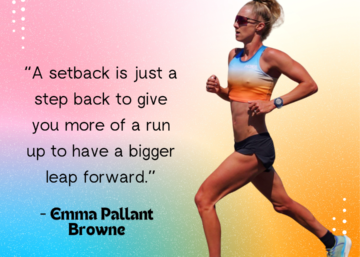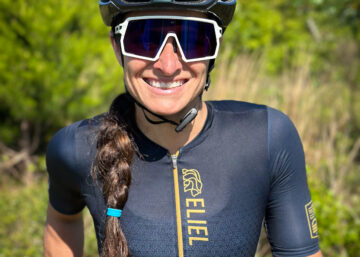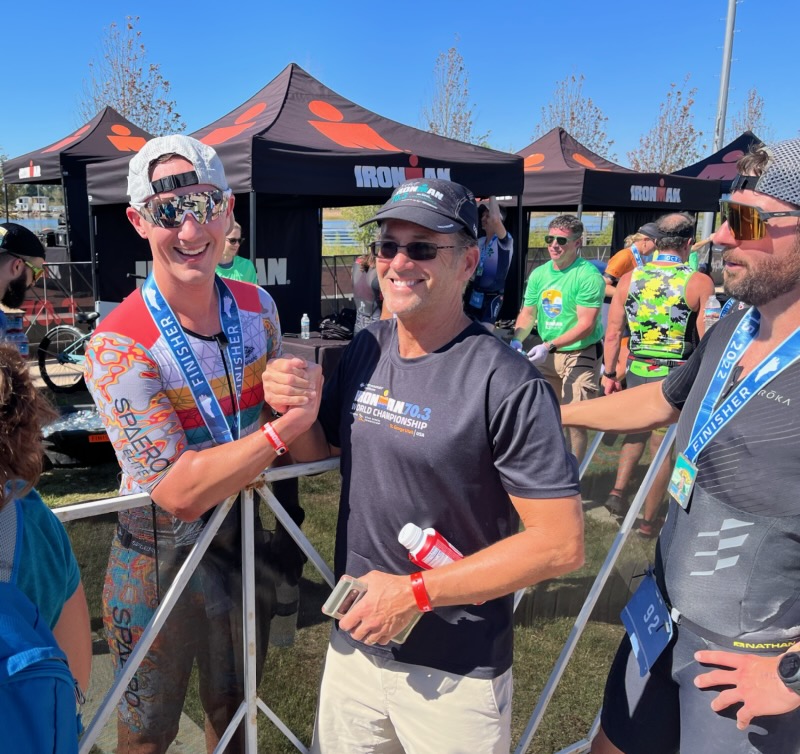
I’m a journalist, so thanks to my job I have the opportunity to chat with some really cool people: everyone from pro triathletes and elite trail runners to top coaches and age groupers with interesting stories.
When I interview someone for an article about a certain topic for a specific magazine, we cover all the necessary questions. But when that’s done, conversation always shifts to talk of life, upcoming races, bikes, shoes, favorite snacks, and sometimes a few “off the record” moments.
Sadly, you never get to see any of that. It just sits on my laptop, destined never to see the light of day… until now! (well, except for the off the record bits.)
This is The Cool Down– a blog series that will serve as a continuation of these interesting “extra” conversations.
It’s what happens when the work for the day is done and you get to chill out, chat with your friends, and enjoy a post-workout snack.
It’s the bonus content, fascinating stories, and juicy tidbits I’ve gathered from chatting with some of the most fascinating characters in the world of endurance sport.
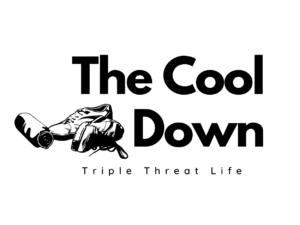 This week’s Cool Down is part 2 of last week’s edition with Neal Palles. Recently, I talked with both Neal and his colleague, Jim Rutberg, for an article that was published in Triathlete Magazine about the peak end rule.
This week’s Cool Down is part 2 of last week’s edition with Neal Palles. Recently, I talked with both Neal and his colleague, Jim Rutberg, for an article that was published in Triathlete Magazine about the peak end rule.
Not only is Jim a CTS Pro Coach, he’s also the author of Ride Inside, The Time Crunched Cyclist, and Training Essentials For Ultrarunning. During our conversation, Jim and I talked about the evolution of coaching and how AI programs might find their way into the world of endurance sport. See what he had to say…
Could AI ever replace traditional triathlon coaching?
No. Not by a long shot, at least in my opinion.
I wholeheartedly believe that the best investment you can make for your triathlon career is a coach.
Coaching looks different for everyone, but there’s one thing it’s not. It’s not a cookie-cutter template that knows nothing about you as an athlete and what you want to achieve. A program downloaded from the internet doesn’t understand how you feel and can’t help you adapt when life gets in the way.
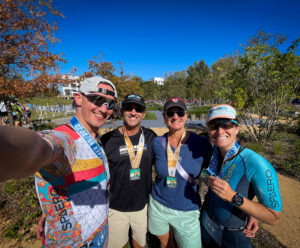
Matt and I with our coaches, Jeff and Annie, at 2022 North Carolina 70.3.
There’s certainly a time and place for online training programs, if that’s the route you want to take. But there’s also no substitute for the real-life wisdom and experience gained from working with athletes of all different shapes and sizes, with different personalities, and levels of motivation.
With the advent of programs like ChatGPT and other artificial intelligence, it was only a matter of time before someone asked the question: Could AI replace traditional coaching?
“In coaching, there’s the data component that gets a lot of focus with training plans, power output, and heart rate ranges,” Jim says. “But, in some instances, that misses the bigger picture of what coaching truly means.”
“I think as training plans and AI programs start to become more prevalent within endurance sports, that’s one thing that’s going to be problematic. They don’t address the behavioral component of what it means to be an athlete, what motivates an athlete, and how to keep an athlete happy.”
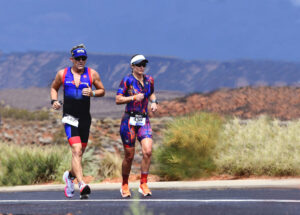
Running with Jeff at the 2022 IRONMAN 70.3 World Championship.
First and foremost, athletes are human beings (often type A, perfectionist, controlling human beings) so it’s always beneficial to have an outside influence that can help us keep things in perspective. A coach will encourage you to focus on the big picture and not stress about that one workout when you didn’t hit your target pace. A coach can teach you how to cultivate mental strength and provide emotional support when things don’t go as planned. A coach will save you from yourself and the bad decisions you will inevitably try to make.
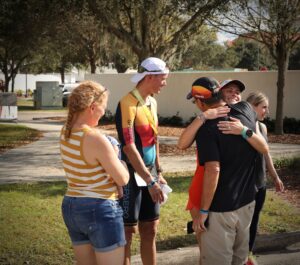
Our coaches were there when Matt and I got engaged, and they gave the toast at our wedding.
Someone might say, “I can coach myself.” Sure, you can try. But have you ever wondered what you might be able to do with expert help? I could probably learn how to rebuild my car’s engine by watching a YouTube video, but I’m still taking it to a professional. And this is your body- your life- not a car.
Someone might say, “Coaching is expensive.” I will never understand how people can justify spending $5,000 on a bike, $2,000 on wheels, and $400 on shoes, but they can’t stomach $150 a month for coaching that will show them how to be the type of athlete who’s worthy of those pricey upgrades.
Someone might say, “I’m not fast or competitive. I don’t need a coach.” Coaching isn’t just for the elite. The best coaches provide instruction, impart wisdom, serve as emotional support, act as a sounding board, help you adapt, and show you strength you didn’t know you had.
The best coaches don’t push you to your breaking point. They push you to your bending point- the spot where you stretch and grow.

Matt and Jeff celebrating at the finish line of 2022 NC 70.3.
“When you’re working with a more experienced coach, the conversation tends to be more about how you feel, what else is going on in your life, and all the things outside of the nuts and bolts of the workouts. Sometimes athletes get a little bit unnerved by that,” Jim says. “They expect more data analysis. The coaches with more experience have graduated to the point where they’ve realized the mechanisms for training are relatively simple. It’s more about the athlete you’re engaging with.”
Matt and I are blessed to have the best coaches in the world, Jeff and Annie Bowman. I was first introduced to them when I was training for my first triathlon, a local super sprint in 2019. I was wholly on board with having them coach me, and they did provide some basic guidance, but they refused to let me pay them until I did my first race and decided if I liked doing triathlon.
I remember crossing the finish line, running over to Annie, and asking, “Ok, will you coach me now?” 🙂
They’re not just our coaches; they’re part of our family. They were there when Matt and I first met (on a century ride in Georgia). They were there when we got engaged (at Florida 70.3). They gave the toast at our wedding.
Annie is my therapist, nutritionist, counselor, and friend. Jeff is Matt’s sounding board, training partner, and motivator. None of this would be possible without them, and we are forever grateful for their guidance, wisdom, kindness, and friendship.
